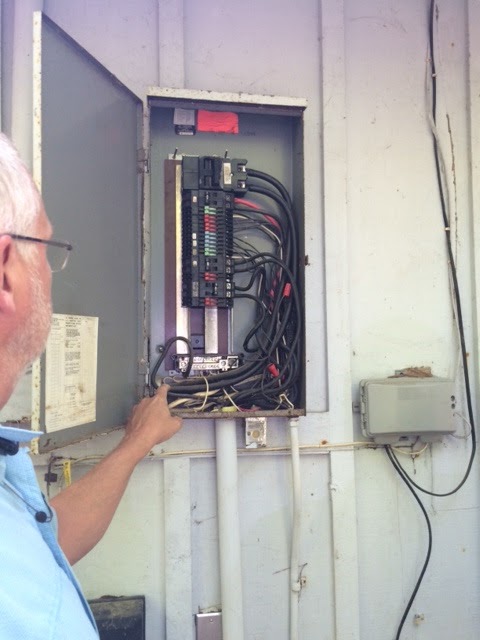Rachel Anna Rosoff, 17, was electrocuted and drowned in the Heritage Point subdivision pool in North Raleigh, NC



Initial report in drowning points to pump failure at Raleigh pool
Family of Rachel Rosoff, 17, who died September 3 in a pool that became electrified, files civil lawsuit against Raleigh-based Williams Electric Motor Repair and Future Connections Electrical Inc.
By Joel Brown
Updated 54 mins ago
RALEIGH, North Carolina (WTVD) -- Instead of celebrating what would've been Rachel Rosoff's 18th birthday, her family was filing a lawsuit inside Wake County Superior Court blaming Rachel's electrocution and drowning on the alleged shoddy repair work of two Raleigh companies.
It was September 3 when the 17-year-old Enloe High senior was found lifeless inside Heritage Point community pool in northern Wake County where she was filling in to be lifeguard that day.
Her family's attorney, David Kirby, says the electrical shock she suffered in the water wasn't enough to kill her but enough to cause her muscles to contract, leaving the strong swimmer unable to move and with no way to fight.
"This was a horrible death," Kirby said. "She was paralyzed by the electricity, but she consciously drowned."
The Rosoffs filed suit against Raleigh-based Williams Electric Motor Repair and Future Connections Electrical Inc. Kirby says in 2011 repair work at the Heritage Point pool, Williams Electric failed to fully replace faulty wiring and neglected to encase the wires in protective conduit underground.
The suit also accuses Future Connections of installing the wrong size capacitor in the pool pump's motor causing it to fail the day Rachel was electrocuted. Future is also accused of failing to report safety hazards that should have been reported.
"They knew or discovered conditions which were dangerous at this pool and they didn't correct them," Kirby said. "And because of that, Rachel Rosoff died."
In an interview last fall with Rachel's mother, Michelle Rosoff was devastated. The family's lawsuit could end in damages to in the multi-millions of dollars.
"We were super close and (Rachel) always said she wanted to be strong like me. And she was so much stronger than I was at 17," Michelle Rosoff said.
Beyond the lawsuit, the Rosoffs are now actively lobbying the state legislature for a new law mandating annual electrical inspections of North Carolina pools.
"Their whole goal is this won't happen to anyone else," Kirby said.
Last week, the NC Department of Labor issued its report on the incident at Heritage Point.
The report includes a recommendation to the pool management company, Aquatic Management Group, to require electrical inspections at its properties.
But, that is simply a recommendation, not a law.
==========
Initial report in drowning points to pump failure at Raleigh pool
A pool motor failure and a broken conductor led to the death of a teen lifeguard in Raleigh, a report states.
By Andrea Blanford and Angelica Alvarez
Monday, September 12, 2016
RALEIGH (WTVD) -- An initial report from the Wake County Inspections Administrator says a pool motor failure and a broken conductor led to the death of a teen lifeguard in Raleigh.
Rachel Rosoff, a senior at Enloe High School, was on duty and alone when a fellow employee showed up for work and found her floating face down in the water on Sept. 3.
The report outlines everything investigators uncovered at Heritage Point Pool.
Read the full report here (.pdf)
The pool was installed and permitted in 1979. Since then, no other construction permits have been filed.
The inspector cited a number of actions that, while unpermitted or not up to code, did not lead to the water being electrified.
Among them, he found an unknown contractor repaired the electrical feeder to the pump in 2011 without the required permit.
Also, a motor bonding wire had been cut and loosely wrapped around the equipment bonding wires, which does not comply with National Electrical Code.
In his conclusion, the inspector found the pool pump motor failed and when it faulted to ground, the grounded conductor was broken, causing the current to travel into the water and pool equipment.
"Since this conductor was open (broken) it could not conduct the necessary current to cause the overcurrent device (breaker) to open (trip)," Gregory Vance, Inspections Administrator, wrote. "The fault current then followed the only path available to it, the pool water, creating a voltage gradient across the pool and pool equipment."
The investigation was conducted at the request of the Wake County Sheriff's Office.
The NC Department of Labor, Occupational Safety and Health Division is also carrying an investigation to find whether safety or health standards were violated at Heritage Point Pool.







